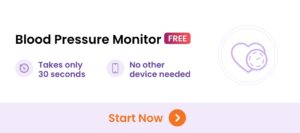What are the 3 symptoms of hypertension?
- Shortness of breath
- Headaches
- Fatigue
Measure your BP now!
Does anxiety cause high blood pressure?
Anxiety does not cause hypertension but can temporarily increase the blood pressure. But stress associated with long term anxiety can be a risk factor for hypertension.

Can hypertension be cured?
Hypertension is a chronic condition. As of date, there’s no permanent cure. However, it can be effectively managed through diet, medications, and lifestyle changes.
What are signs of pressure?
Hypertension is a silent killer, meaning in many cases, people aren’t even aware they have high BP. Therefore, the only sure way to know if you have hypertension is by getting checked by a doctor.
How do you confirm hypertension?
Hypertension is measured using an instrument called a sphygmomanometer. If your blood pressure is above 120/80 mm Hg, it means you have hypertension.
Does caffeine raise blood pressure?
Caffeine from coffee can temporarily increase your blood pressure. It’s unclear why that happens, but it’s advisable to limit your caffeine consumption if you have hypertension.
Does aspirin lower blood pressure?
Aspirin does not lower blood pressure on its own. However, it can thin out the blood and prevent stroke-related blood clots and help manage blood pressure complications.
Does drinking water help lower blood pressure?
Drinking water is an effective lifestyle modification that one can adopt to manage your blood pressure. But water on its own does not lower BP.
What foods cause hypertension?
- Foods high in sodium content (salt)
- Processed foods
Why do I need a blood test for high blood pressure?
Your doctor may prescribe a blood test to assess the damage caused to your vital organs, such as kidneys, due to very high blood pressure.
What are the 4 stages of hypertension?
- Elevated stage – 120-129/80 mm Hg
- High blood pressure stage (Hypertension)1 – 130 – 139/80 – 89 mm Hg
- High blood pressure stage(Hypertension) 2 – >140/90 mm Hg
- Hypertensive crisis – >180/120 mm Hg
Can you live a long life with high blood pressure?
Medication, diet, and lifestyle modifications can significantly improve your quality of life and also life expectancy. But if you don’t seek medical help, you are at a higher risk for cardiovascular and kidney diseases.
Should I lie down if my blood pressure is high?
Sleeping on the left side is the best position to sleep if you have high blood pressure but as such is not a treatment option.
Which organs are affected by high blood pressure?
- Heart
- Brain and nerves
- Eyes
- Kidneys
- Cardiovascular system
What time of the day is blood pressure highest?
Usually, your blood pressure peaks in the morning and evening and drops at night. Blood pressure is lowest when you are sleeping.
What are the symptoms of high blood pressure in a woman?
Mild symptoms include headaches, fatigue and shortness of breath. Severe symptoms that require immediate medical help include shortness of breath, nosebleeds, chest pain, vision problems, palpitations, and blood in the urine.
Can your blood pressure be high for no reason?
There’s no identifiable direct reason for high blood pressure in most adults.Only in a few adults cause can be identified. Hypertension is also known as the “silent killer.”
What is the fastest way to cure high blood pressure?
There’s no quick fix for high blood pressure. The only sure way to manage hypertension is through diet, medication, and lifestyle modifications.
Can I have a healthy pregnancy with hypertension?
Your doctor can effectively manage pregnancy-induced hypertension. Most women with gestational hypertension go on to have healthy pregnancies and delivery.
What causes high blood pressure while pregnant?
Pregnancy-induced hypertension includes
- gestational hypertension and
- Preeclampsia
- Reasons for high blood pressure in pregnancy can be early or late pregnancies, previous cases of hypertension and multiple pregnancies.
Can high blood pressure cause a miscarriage?
Studies suggest that hypertension before pregnancy may increase your chance of miscarriage.
What are the complications of cor pulmonale?
- Syncope
- Hypoxia
- Pedal edema
- Passive hepatic congestion
- Death
Does pulmonary hypertension increase blood pressure?
Pulmonary hypertension is a medical condition that causes the right side of your heart to malfunction.
Can kidney damage from high blood pressure be reversed?
Kidney damage is irreversible. But there is help, and it can be effectively managed through medications.
How long does high blood pressure take to damage kidneys?
Less severe forms of hypertension may take several years. But very high blood pressure can damage your kidneys in a very short span of time.
What color is urine when your kidneys are failing?
Brown, red or purple urine is an indication that your kidneys are failing, but in some patients there can be no change in the color of urine even though kidneys are affected.
Can failing kidneys cause high blood pressure?
Kidneys play a significant role in controlling your blood pressure. As a result, failing kidneys can cause high blood pressure.
Can infected kidneys cause high blood pressure?
Infection can cause scarring and damage to your kidneys. And since kidneys play an important role in controlling your blood pressure, infected kidneys can cause high blood pressure.
Is drinking a lot of water good for your kidneys?
Generally, drinking adequate water is good for your kidneys and overall health. But in case your kidneys are damaged as a result of hypertension, your doctor may advise you to drink a limited quantity of water.